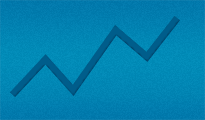“… the voestalpine Group should be able to achieve an (adjusted) operating result (EBITDA) and (adjusted) profit from operations (EBIT) in the business year 2016/17 that will at least come close to the (adjusted) figures in the past business year even if the economic environment remains challenging. Due to the extreme political and economic uncertainties in the current environment, making any additional forecast would contradict the requirements of responsible corporate and capital market communication.” This was last year’s outlook for the business year 2016/17 now ended. The earnings growth projected at the time was even slightly exceeded but from today’s perspective, there is little to add to the reference to political uncertainties in the environment. This is just as relevant for the coming twelve months as it was a year ago.
While the critical statements on the global political conditions made in the previous year continue to apply in full, the economic outlook is today much brighter than a year earlier. This has also been increasingly reflected in the economic forecasts of well-known economic institutions such as the International Monetary Fund or the OECD since the fall of 2016.
Surprisingly, the challenging political environment has not had any real negative impact on this upward trend, at least not yet. The current upswing is being driven first and foremost by a return to stable positive economic growth in China since the previous year and the growth momentum in Europe, which is much stronger than anticipated in both scope and intensity. The global upward trend will also be buoyed somewhat by continued strong economic growth in India, as well as the expectation that Brazil and Russia should achieve an economic turnaround this year following a longer recession in both countries.
The USA is currently contributing less to growth than hoped for at the beginning of 2017. Its economic development over the course of the year will largely depend on the new government’s forthcoming decisions on the country’s fiscal and economic policy going forward.
Demand in many customer segments at the beginning of the new business year is more uniform and overall significantly more positive than a year ago. As well as ongoing strong demand from the automotive industry, the upturn is also supported by sectors such as aircraft, the consumer goods, white goods, and electrical industries, and parts of the mechanical engineering sector, as well as signs of a recovery in the (European) construction industry and an improvement—primarily volume-driven—in the oil and gas sector. Demand is weaker in the rail sector (infrastructure), especially in Europe. Conventional energy generation (construction of power plants and energy engineering) in Europe has been very modest for years now as a consequence of the energy transition (“Energiewende”).
Prices for the primary raw materials used in steel production (iron ore, metallurgical coal, scrap) should settle somewhat over the course of the year following an extremely volatile phase since the fall of 2016.
Based on this economic trend, the voestalpine Group should record strong revenue and earnings in the first half of the new business year, with figures significantly higher than in the same period of the previous year. However, the economic trend in the second half of the business year will only be able to be assessed in concrete terms after the coming summer.
In light of the fact that
- a number of recent major investments—such as the HBI plant in Texas, USA, the new wire production in Leoben/Donawitz, Austria, and several downstream investments in Europe, the USA, and China—will be fully included in the voestalpine Group’s revenue and earnings for the first time in the course of the business year,
- steel and steel processing capacities, including the heavy plate sector, are already largely utilized until the end of the business year and the increasingly strong downstream focus is leading to comparably stable business development,
- the effect of any US trade barriers and pressure from European steel imports at dumping prices on voestalpine products should be limited overall,
- the Group-wide cost and efficiency optimization program being implemented is expected to further strengthen the Group’s competitiveness,
a clearly positive revenue and earnings development is expected from today’s perspective despite uncertainties in the outlook for the voestalpine Group in the second half of the business year 2017/18.
Linz, May 24, 2017
The Management Board
Wolfgang Eder
Herbert Eibensteiner
Franz Kainersdorfer
Robert Ottel
Franz Rotter
Peter Schwab
This report is a translation of the original report in German, which is solely valid.

Share page